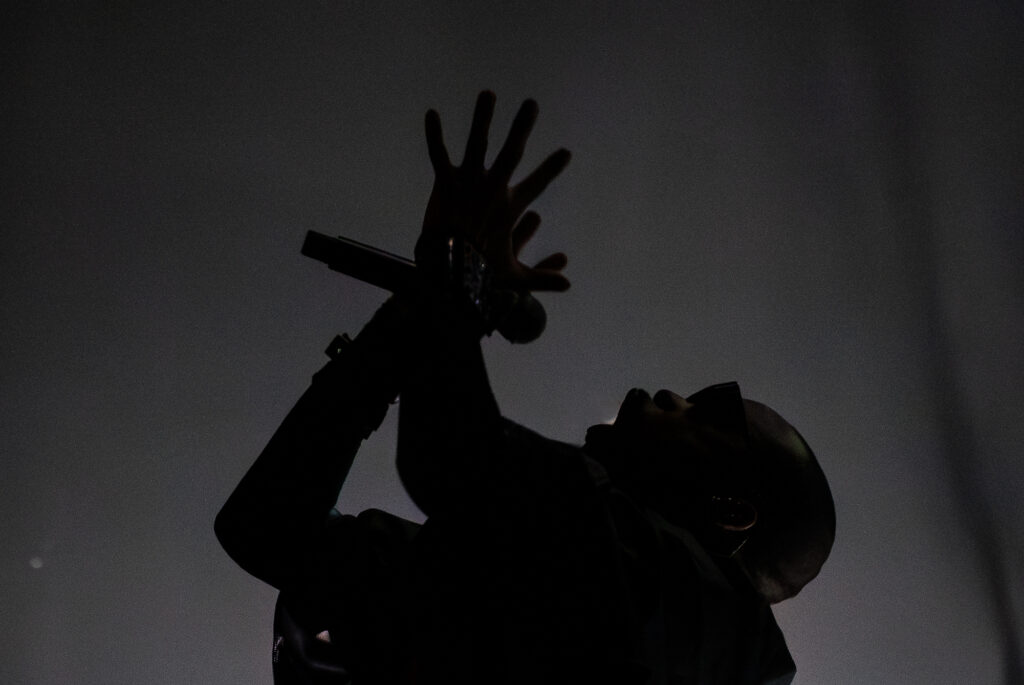Genesis Owusu is more than simply a musician: he’s an artist, a performer, a poet, and perhaps even a philosopher. He was a standout performer at Boston Calling and I made it a priority to catch him when he returned to the area. He brought his multifaceted act to the Sinclair last Thursday evening and left the audience completely wowed.

Owusu hails from Canberra, Australia and is of Ghanaian descent. His music defies a clear genre, drawing on elements from hip-hop, EDM, soul, funk, and rock. For example, “Leaving the Light” showcases hip-hop vocals above a driving EDM bassline. “See Ya There” is a smooth R&B and soul track, and “Balthazar” uses a rock/metal guitar riff as the foundation for the song. This variety of genres provided a good balance to his set, and, combined with Owusu’s gift for writing catchy vocal and instrumental hooks, the set was electric and easy to sing and dance along to. Additionally, Owusu added a lot of energy to his songs, whether that was with intense vocal delivery or dancing and movements.
Aesthetics and performance are also important to Owusu, and it was clear that he invested a great deal of time and energy into making his performance a well-rounded show. The only stage prop was a ceiling-height object covered with a black drape. After the first song, the drape dropped, revealing a massive mirror with strobe lights inside. Owusu’s wardrobe is also striking, as he wore a black leather trench coat with bold red stripes and his now-signature sunglasses.


While all of the above elements were present at the Boston Calling show, what set this show and tour apart was Owusu’s new songs. He is touring in support of a new concept album, The Struggler, which, in his own words, “is about roaches and existentialism… but at its core it’s about us, it’s about humanity, and our stubborn perseverance and will to survive through any bullshit that’s pelted at us every day. Our ability to wake up and make it to tomorrow is truly a strength that we don’t appreciate.”

The album tells the story of a character called “the Roach.” Reading through the lyrics, the Roach appears to be a metaphor for how most humans are viewed and treated by society: as an insignificant slave to the systems that bind us. God is another character in Owusu’s universe, though that could mean any number of specific gods, a generic god, or a metaphor for organized religion. And, yes, he references Franz Kafka’s The Metamorphasis, the classic existentialist novel about a man navigating his new life after transforming into a roach. From “The Roach”: “Feeling like Gregor Samsa / A bug in the cog of a grey-walled cancer.”


Owusu began his performance by processing out to the stage holding what appeared to be a large Bible while a distorted voice-over performed spoken word that contemplated the themes of the album. The most striking song of his performance was “The Old Man.” The refrain goes: “There’s an old man waiting in the sky just to fuck my life up.” He continues to muse on the struggle of individuals, rapping “What’s a roach to a God? Tryna find the drive but I got a slashed tire / Everyday I wake up, boy I’m battling Goliath.” The song then ends with Owusu almost chanting over a driving bassline: “Your master is a system, your master is a suit / Your master is absurdity, God bless the truth.”


The contrast between Owusu’s uptempo, danceable tracks and the heavy themes that his lyrics address was striking, but it elevated the performance. This wasn’t merely a fun show with great songs and performances, but a philosophical, almost spiritual experience. By the end of the show Owusu had the crowd chanting “Fear the roach / Love the roach.” This dichotomy cut deep for me. After Gregor Samsa turns into a roach, his family must wrestle with how to treat him: is he still family or is he a monster? Do you respond to your fellow humanity with fear or love, when all of us are sometimes roaches? Indeed, what can any of us do in the face of our daily struggles but keep persisting and find joy where we can, even if that includes dancing to hip-hop tracks?


